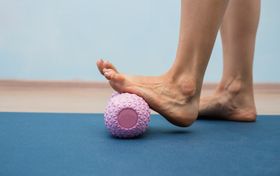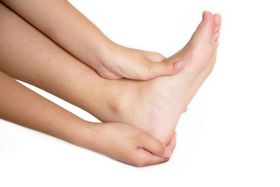Can People With Flat Feet Be Top Athletes?
Updated December 9, 2024

Flat feet are a common and generally painless foot condition. With flat feet, the entire sole touches the floor when you stand because of fallen or absent arches. While it is asymptomatic in many people, some find that flat feet affect how they stand and move.
Take a look at our post on a collapsed arch vs. flat feet to learn the difference.
Can Flat Feet Hinder Sports Performance?
Flat feet are generally asymptomatic and don't affect people's daily lives. However, flat feet can predispose the foot to overpronation. For an athlete, this can severely impact their performance.
There is suboptimal energy transfer between the foot and the ground with overpronation. Consequently, the muscles, ligaments, and tendons undergo more strain and have to exert more force. Without intervention, the cumulative biomechanical inefficiency will limit an athlete's performance. It can also lead to potential health complications.
Disadvantages of Having Flat Feet as an Athlete
The increased tension caused by overpronation will lead to heel pain, muscle spasms and weakness, ankle weakness, shin splints, and knee, hip, and back pain. There are also many secondary conditions to flat feet that may arise.
Most sports also require a high degree of balance, speed, agility, and flexibility to change directions quickly. If the body has to do extra work, as is common with flat feet, it may be somewhat difficult for athletes to achieve such performance levels.
The Importance of Correct Footwear for Athletes With Flat Feet
There is suitable footwear available for every kind of sport. It's especially important to wear the proper footwear if you have flat feet. They can help keep your foot neutrally aligned, limiting overpronation and the added tension that comes with it. Generally, wearing footwear with limited flexibility, a supportive sole, proper cushioning, and reinforced heel counters is recommended for flat feet.
In addition to the correct footwear, orthotics are also essential. They work together with footwear to restore foot health and provide foot support for flat feet. Apart from correcting malalignment, inserts and arch support also help improve your athletic performance by reducing the risk of injury, providing adequate support, and are designed to suit your specific requirements. The best insoles for flat feet come with arch support, a heel wedge, and a metatarsal bar.
Are arch supports hurting your flat feet? Learn more about how it's possible to have too much arch support.
Are There Top Athletes With Flat Feet?
While flat feet can negatively impact performance, the right intervention has helped some top athletes rise above it. Among these athletes are Ethiopian marathon runner Haile Gebrselassie, the most reputed long-distance runner with four gold medals to his name, and American runner Alan Webb, whose record of running a mile in 3 minutes and 46 seconds took 14 years to break. There is also Saïd Aouita, Shawn Crawford, and Steven Plasencia, to name a few.
Though flat feet can negatively affect performance, any athlete can bridge the gap and improve their performance with the right flat feet remedies.
» Experiencing calf pain due to flat feet as an athlete? Discover the best insoles to treat calf pain








